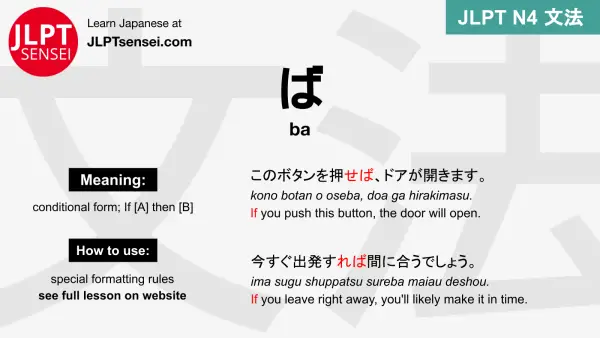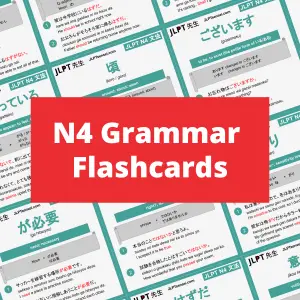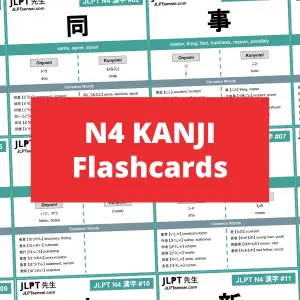Learn Japanese grammar: ば (ba). Meaning: conditional form; If [A] then [B].
Standard format: [A] ば [B]
If condition [A] is met, then [B] will happen.
Rules for ば (ba) Conditional Form
There are some special format rules for this grammar, which I will explain now with some examples before moving on to our main example sentences.
Verbs
- Use dictionary form.
- Change the ending from “u” to an “e”.
- Add ば at the end.
う Verb – Example
行く = いく = iku = to go
ku changes to ke
行けば = いけば = ikeba = if (you) go
る Verb – Example
食べる = たべる = taberu = to eat
ru changes to re
食べれば = たべれば = tabereba = if (you) eat
Special Verb 来る
来る = くる = kuru = to come
ru changes to re
来れば = くれば = kureba = if (you) come
Special Verb する
する = suru = to do
ru changes to re
すれば = sureba = if (you) do
Verb (Negative Form)
- Use dictionary negative form.
- Change the ending ない (nai) to なければ (nakereba).
行かない = いかない = ikanai = to not go
changes to
行かなければ = いかなければ = ikanakereba = if (you) do not go
い-adjective (Negative)
- The rules are the same, change the ending ない (nai) to なければ (nakereba).
大きくない = おおきくない = ookikunai = not big
changes to
大きくなければ = おおきくなければ = ookikunakereba = if not big
い-adjective
- Change the ending い (i) to ければ (kereba).
大きい = おおきい = ookii = big
changes to
大きければ = 大きければ = ookikereba = if big
な-adjective
- At the end, add either of the two.
- ならば (naraba)
- であれば (de areba)
便利 = べんり = benri = convenient
changes to
便利ならば = べんりならば = benri naraba = if convenient
(OR)
便利であれば = べんりであれば = benri deareba = if convenient
な-adjective (Negative)
- At the end, add either of the two.
- じゃなければ (janakereba) (more casual)
- でなければ (de nakereba)
便利 = べんり = benri = convenient
changes to
便利じゃなければ = べんりじゃなければ = benri janakereba = if not convenient
(OR)
便利でなければ = べんりでなければ = benri denakereba = if not convenient
Noun
- Same as な-adjective
- At the end, add either of the two.
- ならば (naraba)
- であれば (de areba)
日本人 = にほんじん = nihonjin = Japanese
changes to
日本人ならば = にほんじんならば = nihonjin naraba = if Japanese
(OR)
日本人であれば = にほんじんであれば = nihonjin deareba = if Japanese
Noun (Negative)
- Same as な-adjective (negative)
- At the end, add either of the two.
- じゃなければ (janakereba) (more casual)
- でなければ (de nakereba)
日本人 = にほんじん = nihonjin = Japanese
changes to
日本人じゃなければ = にほんじんじゃなければ = nihonjin janakereba = if not Japanese
(OR)
日本人でなければ = にほんじんでなければ = nihonjin denakereba = if not Japanese
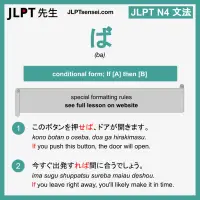
Click the image to download the flashcard.
Download all N4 grammar flashcards.
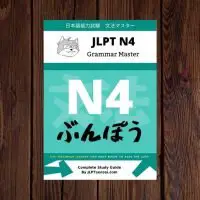
Download our complete
JLPT N4 Grammar Master E-book.
Access ALL extra downloads, ebooks, and study guides by supporting JLPT Sensei on Patreon.
ば - Example Sentences 例文
Each example sentence includes a Japanese hint, the romaji reading, and the English translation.
Click the below red button to toggle off and and on all of the hints, and you can click on the buttons individually to show only the ones you want to see.
Example #1
このボタンを押せば、ドアが開きます。
Example #2
あなたが行けば、わたしも行くよ。
Example #3
今すぐ出発すれば間に合うでしょう。
Example #4
毎日練習をすれば、上手になるよ。
Example #5
数週間もすれば、みんな忘れるよ。
Example #6
海に行けば誰だって水着を着るわ。
Example #7
アメリカ大使館へ行きたいんですが、どう行けばいいですか。
Vocabulary List 語彙
| Kanji 漢字 | Kana カナ | English 英語 |
|---|---|---|
| 便利 | べんり | convenient |
| 押す | おす | to push; to press |
| 開く | ひらく | to open |
| 出発 | しゅっぱつ | to depart |
| 間に合う | まにあう | to make it in time |
| 毎日 | まいにち | everyday |
| 練習 | れんしゅう | practice |
| 上手 | じょうず | skilled |
| 数週間 | すうしゅうかん | a few weeks |
| 忘れる | わすれる | to forget |
| 海 | うみ | ocean |
| 誰だって | だれだって | everyone |
| 水着 | みずぎ | swim suit |
| 着る | きる | to wear |
| 大使館 | たいしかん | embassy; consulate |
View all JLPT N4 Vocabulary Lessons
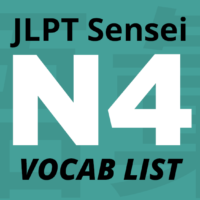
View all JLPT N4 Grammar Lessons
JLPT N4 Study Guide
JLPT N4 Grammar Master [e-book]
Complete Study Guide
This e-book includes every grammar point you need to know in order to pass the JLPT N4, with detailed usage notes and numerous example sentences.
Pages: 293.
Grammar lessons: 131.
